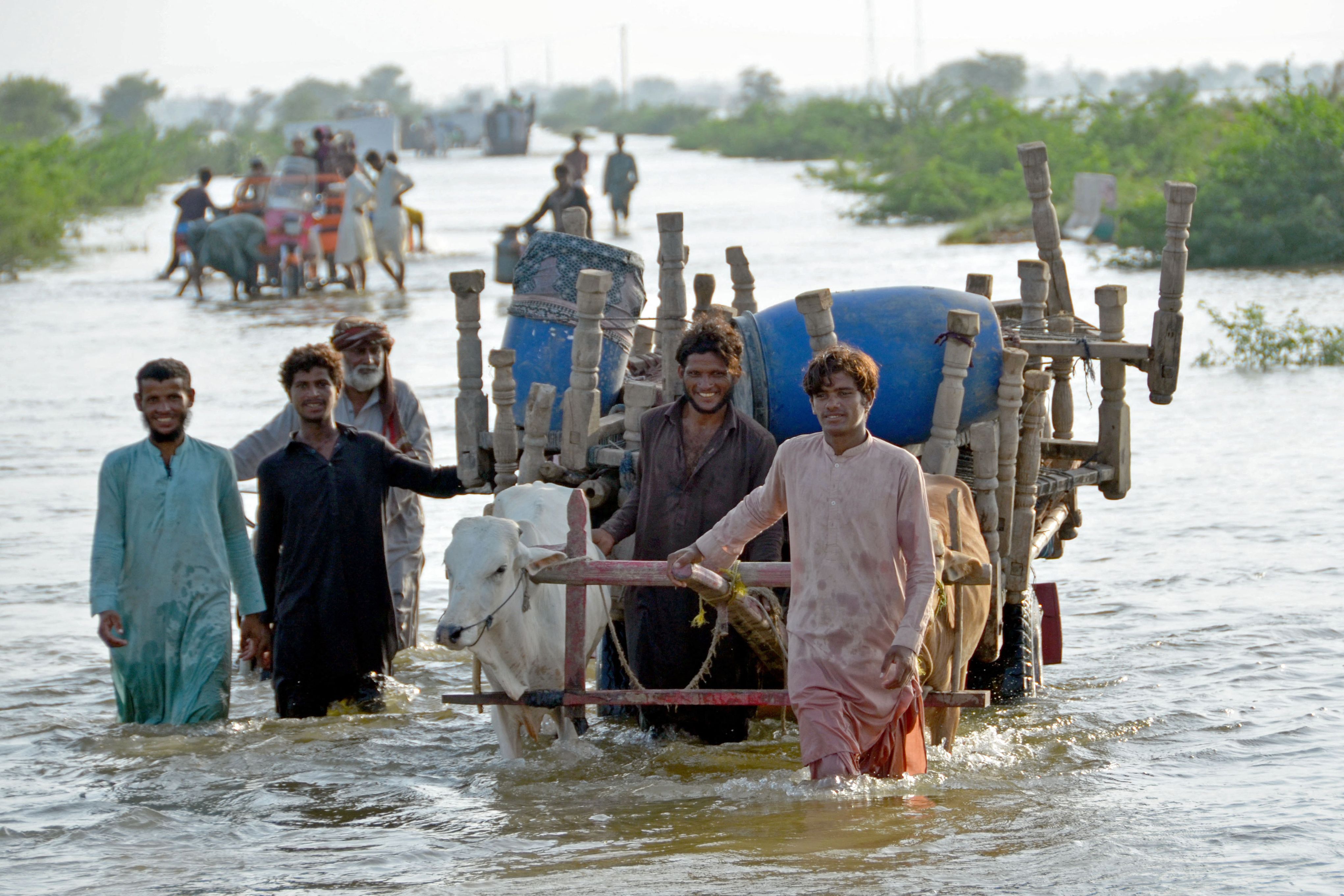Pakistan floods hit 33m people
UN chief blames ‘monsoon on steroids’ on the global climate crisis

A free daily email with the biggest news stories of the day – and the best features from TheWeek.com
You are now subscribed
Your newsletter sign-up was successful
More than 33 million people, or one in seven Pakistanis, are estimated to have been affected by deadly flooding, with Prime Minister Shehbaz Sharif describing the disaster as the “toughest moment” in Pakistan’s history.
The summer rain is the “heaviest recorded in a decade”, reported the BBC, and government ministers are claiming that Pakistan is paying the price for global climate change. “We are suffering from it but it is not our fault at all,” Sharif told a press conference on Tuesday.
UN Secretary-General António Guterres said the South Asian nation had been devastated by a “monsoon on steroids” and the “climate catastrophe” had killed “more than 1,000 people, with many more injured”.
The Week
Escape your echo chamber. Get the facts behind the news, plus analysis from multiple perspectives.

Sign up for The Week's Free Newsletters
From our morning news briefing to a weekly Good News Newsletter, get the best of The Week delivered directly to your inbox.
From our morning news briefing to a weekly Good News Newsletter, get the best of The Week delivered directly to your inbox.
“South Asia is one of the world’s global climate crisis hotspots,” he told a news conference, adding that people living in the “hotspots” are 15 times more likely to die from the impact of changing climates.
The UN chief launched an urgent humanitarian appeal to member countries for $160m, which would be used to support the government’s response to the disaster and provide 5.2 million people with food, water, sanitation, emergency education, protection and support.
A third of Pakistan is believed to be underwater, with the floods estimated to have caused over $10bn in damages, reported ITV News. The National Disaster Management Authority said the death toll from the monsoon rains and floods had reached 1,136.
Around half a million of those displaced are living in organised camps, said The Guardian, while others have had to find their own shelter.
A free daily email with the biggest news stories of the day – and the best features from TheWeek.com
Pakistan is responsible for “less than 1% of the world’s planet-warming gases”, said CNN, but is the eighth most vulnerable nation to the climate crisis, according to the Global Climate Risk Index.
“Let’s stop sleepwalking toward the destruction of our planet by climate change,” said Guterres. “Today, it’s Pakistan. Tomorrow, it could be your country.”
Chas Newkey-Burden has been part of The Week Digital team for more than a decade and a journalist for 25 years, starting out on the irreverent football weekly 90 Minutes, before moving to lifestyle magazines Loaded and Attitude. He was a columnist for The Big Issue and landed a world exclusive with David Beckham that became the weekly magazine’s bestselling issue. He now writes regularly for The Guardian, The Telegraph, The Independent, Metro, FourFourTwo and the i new site. He is also the author of a number of non-fiction books.
-
 Bonfire of the Murdochs: an ‘utterly gripping’ book
Bonfire of the Murdochs: an ‘utterly gripping’ bookThe Week Recommends Gabriel Sherman examines Rupert Murdoch’s ‘war of succession’ over his media empire
-
 Gwen John: Strange Beauties – a ‘superb’ retrospective
Gwen John: Strange Beauties – a ‘superb’ retrospectiveThe Week Recommends ‘Daunting’ show at the National Museum Cardiff plunges viewers into the Welsh artist’s ‘spiritual, austere existence’
-
 Should the EU and UK join Trump’s board of peace?
Should the EU and UK join Trump’s board of peace?Today's Big Question After rushing to praise the initiative European leaders are now alarmed
-
 The plan to wall off the ‘Doomsday’ glacier
The plan to wall off the ‘Doomsday’ glacierUnder the Radar Massive barrier could ‘slow the rate of ice loss’ from Thwaites Glacier, whose total collapse would have devastating consequences
-
 Can the UK take any more rain?
Can the UK take any more rain?Today’s Big Question An Atlantic jet stream is ‘stuck’ over British skies, leading to ‘biblical’ downpours and more than 40 consecutive days of rain in some areas
-
 As temperatures rise, US incomes fall
As temperatures rise, US incomes fallUnder the radar Elevated temperatures are capable of affecting the entire economy
-
 The world is entering an ‘era of water bankruptcy’
The world is entering an ‘era of water bankruptcy’The explainer Water might soon be more valuable than gold
-
 Climate change could lead to a reptile ‘sexpocalypse’
Climate change could lead to a reptile ‘sexpocalypse’Under the radar The gender gap has hit the animal kingdom
-
 The former largest iceberg is turning blue. It’s a bad sign.
The former largest iceberg is turning blue. It’s a bad sign.Under the radar It is quickly melting away
-
 How drones detected a deadly threat to Arctic whales
How drones detected a deadly threat to Arctic whalesUnder the radar Monitoring the sea in the air
-
 ‘Jumping genes’: how polar bears are rewiring their DNA to survive the warming Arctic
‘Jumping genes’: how polar bears are rewiring their DNA to survive the warming ArcticUnder the radar The species is adapting to warmer temperatures